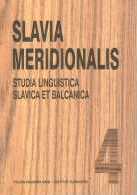Семантика на минали страдателни причастия от непреходни глаголи в българския език
Semantics of past passive participles from intransitive verbs in Bulgarian
Author(s): Tatjana AleksandrovaSubject(s): Language and Literature Studies
Published by: Instytut Slawistyki Polskiej Akademii Nauk
Summary/Abstract: The paper presents an investigation of the semantics of past passive participles derived from intransitive verbs and structures with the component ce, which marks a variety of semantic and syntactic changes in the proposition, as well as the functioning of predicative structures with such participles. The study is based on the methodology of semantic syntax and, in particular, on the understanding of the compound structure of complex concepts and the varying theme-rheme order of the arguments of the predicate – which opens possibilities for different conceptualizations of one and the same situation. We also refer to Prof. Karolak’s theory of aspect as a semantic category and on aspectual meaning as a configuration of the simple aspectual meanings of perfectivity and imperfectivity, as well as on his classification of verbs. An analysis is made of the dependency between the possibility to form passive participles out of ntransitive verbs and the semantic structure of the predicate, expressed by the respective verb. It is established that passive participles are formed out of intransitive verbs with the component ce, which are bearers of configurations of aspectual components with a specific semantic value, one of these being state – predominantly of inchoative configurations, semantically derived from resultatives, and of triaspectual telics, reduced in the aorist stem to inchoatives. We arrive at the conclusion that structures with the auxiliary "s'm" and passive participles of intransitive verbs are markers of statal passive and mainly express states from man’s emotional and mental sphere. Such structures are also used to code states of affairs as a result of processes and activities, which according to the speaker’s assessment are not subject to specification, are not brought about by intensional impact, are not observable, or their substantiation is not communicatively relevant.
Journal: Slavia Meridionalis
- Issue Year: 2004
- Issue No: 04
- Page Range: 139-199
- Page Count: 61
- Language: Bulgarian

